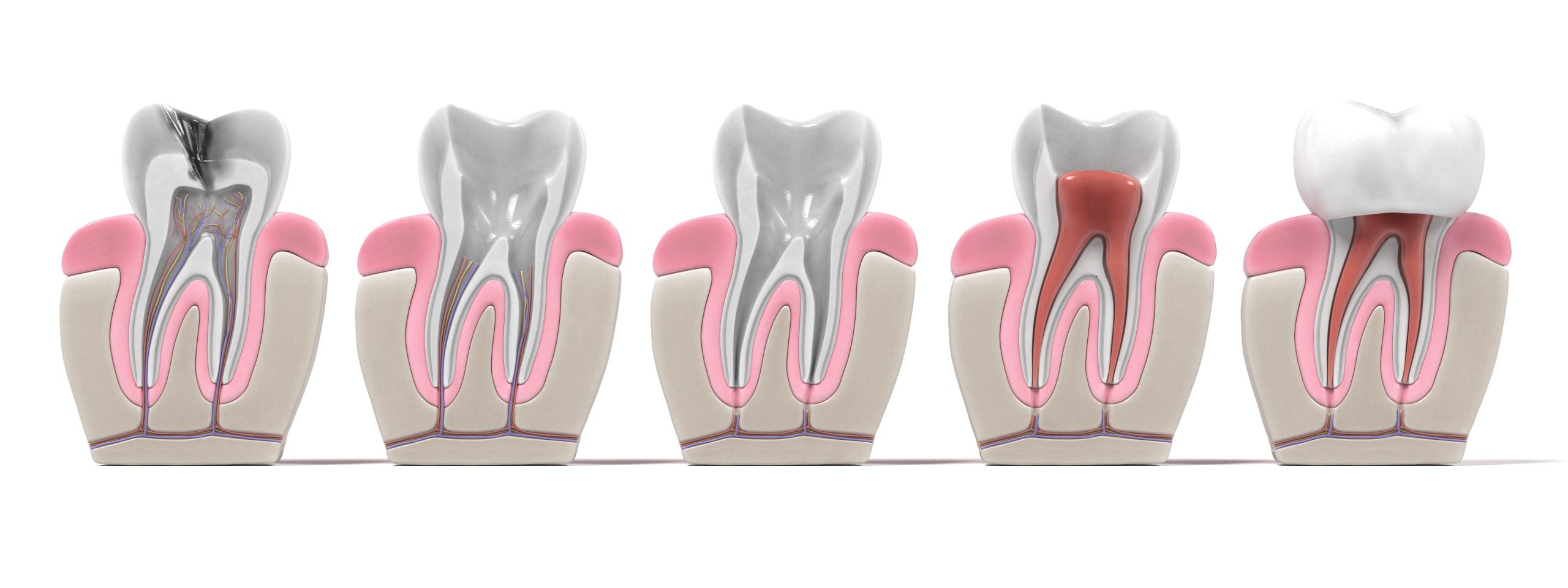If you’ve ever heard someone say, “I have a root canal procedure coming up,” you may wonder what exactly that is. A root canal treatment is a dental procedure performed by a dentist or an endodontist (a specialist who works with the roots and nerves inside your teeth) to help save a tooth from further decay or nerve damage due to infected pulp.
If you’ve ever heard the term “root canal” and felt a shudder of fear, you’re not alone. The root canal procedure is considered difficult, time-consuming, and painful. But, while a root canal treatment may sound intimidating, it’s a standard and routine dental procedure.
You might be nervous about needing one if you’ve heard tales of terrifying root canals. But the truth is, if your dentist recommends a root canal to save your affected tooth, it’s excellent news – and much better than having your tooth extracted! A root canal can actually save your natural tooth from more serious damage, and the procedure itself isn’t nearly as bad as it sounds!
If you’ve been told you need root canal therapy, don’t worry—you’re in the right place. We’ll explain a root canal and why it might be necessary for your dental health. Let’s take a closer look!
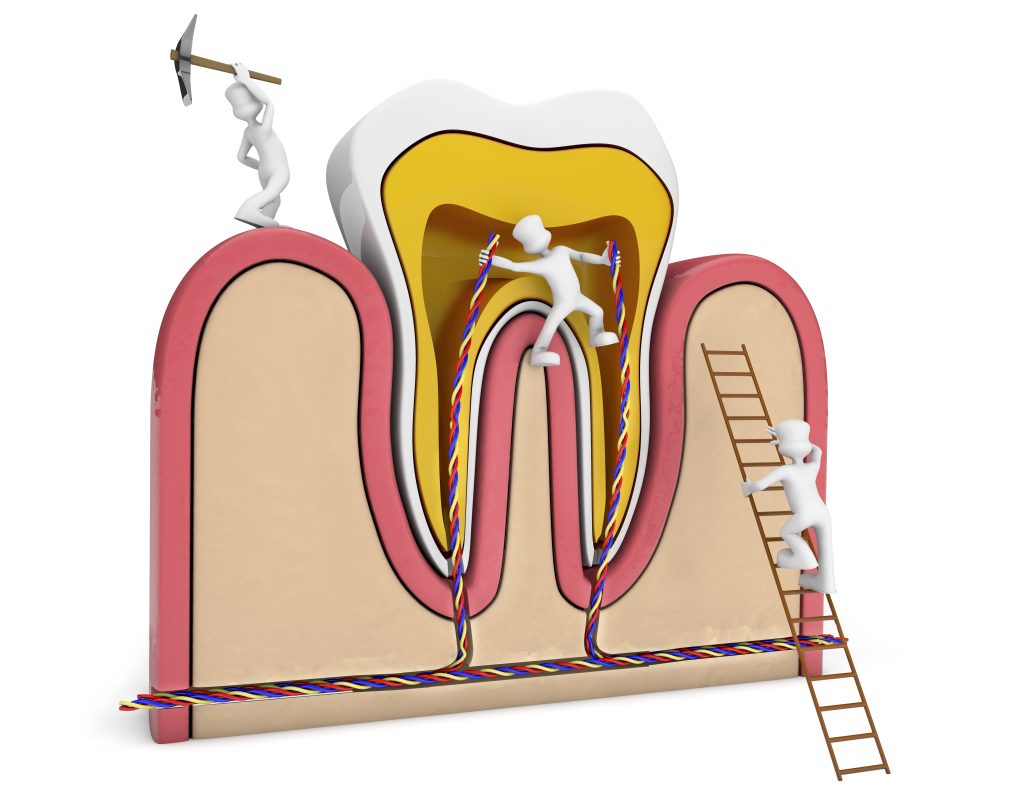
What are Root Canals for?
Root canals are a common dental procedure that many people are familiar with. Still, not everyone knows exactly what they are and why they’re necessary. A root canal is an endodontic procedure that removes the damaged or infected pulp tissue within the affected tooth and helps to save a diseased tooth from further damage caused by issues like deep cavities, infection, or trauma. Therefore, it’s essential to understand the basics of root canals to make an informed decision about your dental treatment.
The process for root canal treatments is quite simple. First, you will meet with a root canal specialist so they can assess the extent of damage done to your tooth and discuss possible treatment options with you.
Once they determine that you need a root canal treatment, your dentist or endodontist will numb the affected area with local anesthesia and use specialized tools, like small files and irrigation solutions, to access the inner space of the tooth (known as the “pulp chamber”) and remove any decayed material, bacteria, and other debris within the dental pulp.
The dental pulp consists of nerve tissue, blood vessels, and soft tissue inside the tooth. When the tooth root becomes infected or inflamed due to decay, trauma, or other factors, it can cause pain and discomfort. A root canal helps relieve this pain in root-filled teeth by removing the infected tissue from the tooth pulp and filling all these empty spaces with a rubber-like material called gutta percha. The dentist will then seal it off with cement or another protective material. The filling material helps with root canal safety by protecting the remaining healthy tissue and preventing future infection or damage.
In some cases, your general dentist may also recommend placing a permanent crown over your treated tooth to protect it from further damage from the infected root canal while restoring its structure. The entire process typically takes around an hour, depending on how complex the procedure is.
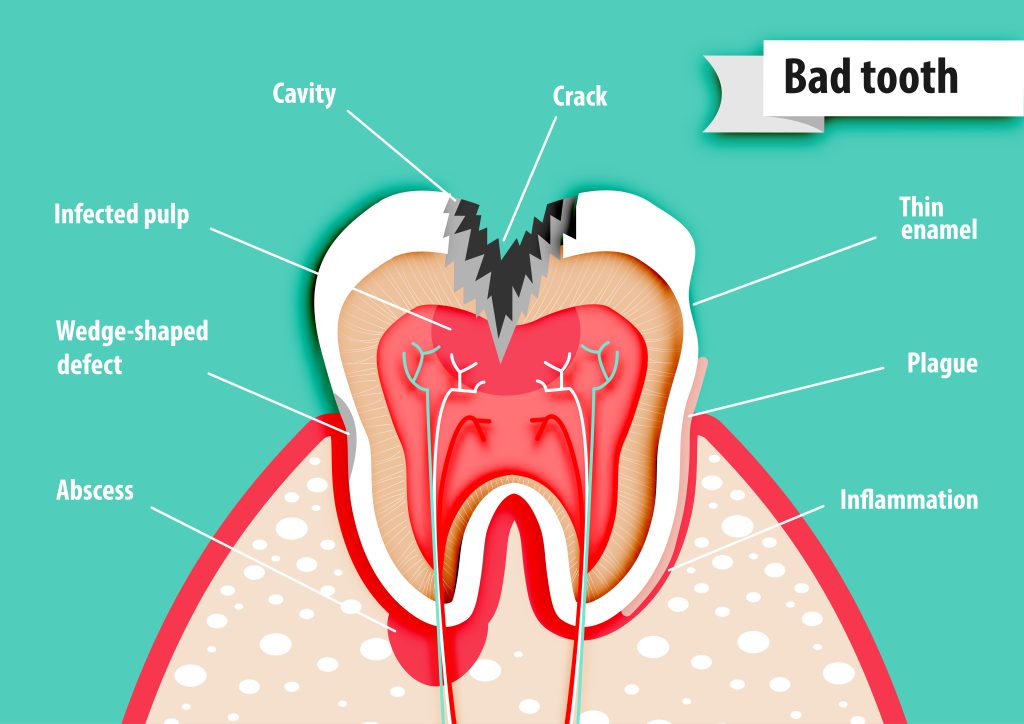
When is a Root Canal Necessary?
Regarding dental procedures, few words strike fear into a patient’s heart quite like the dreaded “root canal.” But despite their infamous reputation, a root canal is an essential procedure in some instances.
Essentially, a root canal is necessary when the nerve tissue or tooth pulp chamber of the tooth becomes infected or damaged, which can happen for a variety of reasons, including a deep cavity or cracked tooth, trauma to the natural tooth or the tissues surrounding the tooth, or repeated dental procedures. In some cases, endodontic treatment options may also be recommended if you experience mild discomfort or tooth pain due to infection or nerve damage. Your dentist will be able to determine if a root canal is necessary for your situation after examining your teeth and taking X-rays of them.
If left untreated, an infected tooth can lead to serious oral health problems and even spread to other body parts. Bacteria and infection can spread throughout your mouth and cause serious issues such as pain, swelling, abscesses (pus-filled sacs), bone loss around the affected area, infection of the surrounding bone, and even loss of your teeth and connective tissue.
So while a root canal may not be the most glamorous procedure in clinical endodontics, they are essential in maintaining overall oral health and may be the only way to save the tooth.

What is the Most Common Reason for a Root Canal?
The most common reason people need this treatment option is that they have cavities that have gone untreated for too long. Cavities are caused by bacteria that feed on sugary substances in your mouth, creating holes in your teeth over time. If these cavities are left untreated for too long, they can cause infection in the pulp of your teeth—which means you may need a root canal to save the tooth and prevent reinfection.

Are There Any Risks Associated With Root Canals?
Fortunately, the root canal system is generally a safe procedure with few associated risks. The most common risk associated with a root canal is infection; however, this risk is relatively low compared to other dental procedures like tooth extraction or single-tooth implants, which involve more invasive treatment methods. If you follow your dentist’s instructions for keeping your mouth clean after the root canal procedure, avoid chewing at the site, and practice good oral hygiene habits daily, you should have no issues with post-procedure infections or complications with the treated tooth.
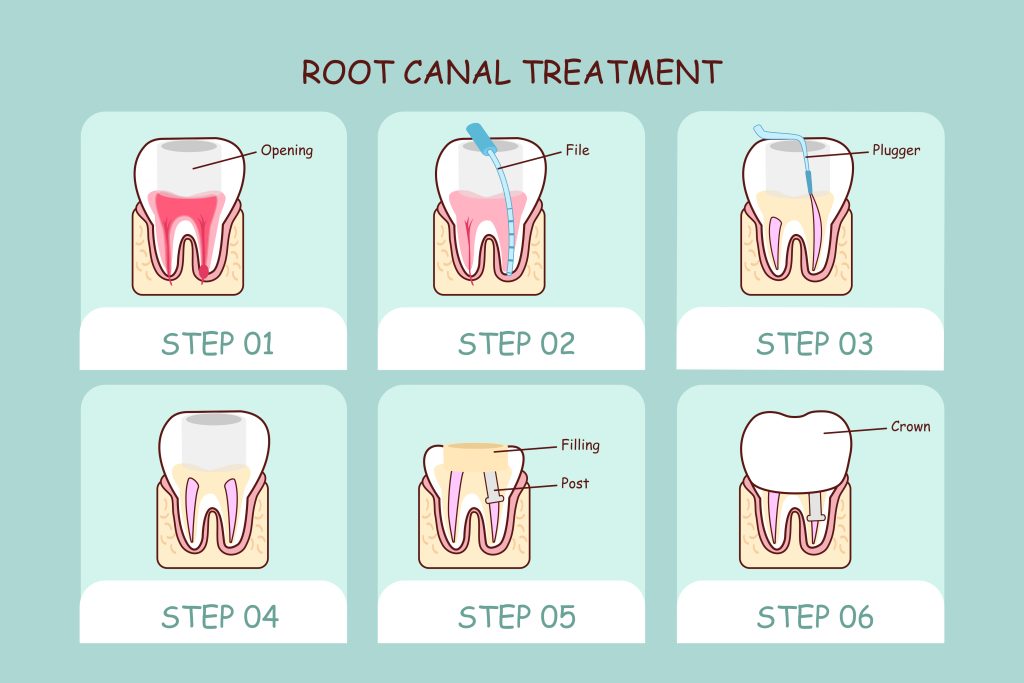
Root Canals vs. Fillings
It’s important not to confuse a root canal treatment with a tooth filling—they are different procedures with different purposes. While both methods are used to treat tooth decay and restore the health of the infected tooth, the approach and outcomes vary.
Fillings are generally used for minor cavities within a tooth. The decayed portion of the natural tooth is removed, and the hole is filled with a composite resin material. Fillings will help close up any cavities and protect against further decay, but when it comes to damage more intrusive than surface-level cavities, a root canal treatment may be necessary to protect the nerve of the tooth and prevent any further damage or infection from reaching blood vessels.
Root canal therapy is necessary when a cavity has progressed to the inner pulp of the tooth, causing deep decay, inflammation, and infection. Root canal treatments involve removing the infected pulp from within the tooth entirely to eliminate bacteria so that no further infection occurs. A root canal treatment is ultimately a preventative procedure that helps maintain your tooth and overall oral health by eliminating any existing issues while assisting to prevent infection or damage after the final restoration. By understanding when and why this procedure may be necessary, you can rest assured that your endodontic therapy team is taking the required steps to protect your long-term oral health and save your tooth.

Are Root Canals a Painful Dental Procedure?
The good news is that modern dentistry has made significant advances over the years in pain management during procedures like root canal treatment—so much so that most people don’t experience any significant discomfort during their endodontic treatment appointment!
Does a Root Canal Hurt?
Your dentist will use local anesthesia to numb the area around your tooth before beginning work on the infected pulp; however, some people may still feel pressure during root canal therapy since this type of anesthesia won’t eliminate all sensations. Afterward, you should feel very little discomfort in your tooth post-procedure once the anesthetic wears off (although mild soreness is normal after an endodontic treatment). Your dentist may prescribe medication after extreme treatments or advise you to seek an over-the-counter medication to control the pain and swelling.
If you have anxiety over your root canal treatment, speak with your dentist about sedation options to help make you more comfortable during the procedure.

Sedation Options for a Root Canal Procedure
Suppose you’re feeling anxious or nervous about root canal therapy. In that case, a few sedation options can help make your dental experience more comfortable.
Nitrous Oxide
For instance, nitrous oxide (also known as laughing gas) is a mild form of sedation that helps relax patients and reduce pain or discomfort during the procedure.
Oral Sedation
Oral conscious sedation, on the other hand, is a form of sedation that uses a pill taken before your appointment to help you relax and manage any fear or anxiety.
Your dentist can recommend which option is best for you based on your individual dental needs; either way, you can rest assured that most sedatives used during root canal procedures are safe and non-addictive.
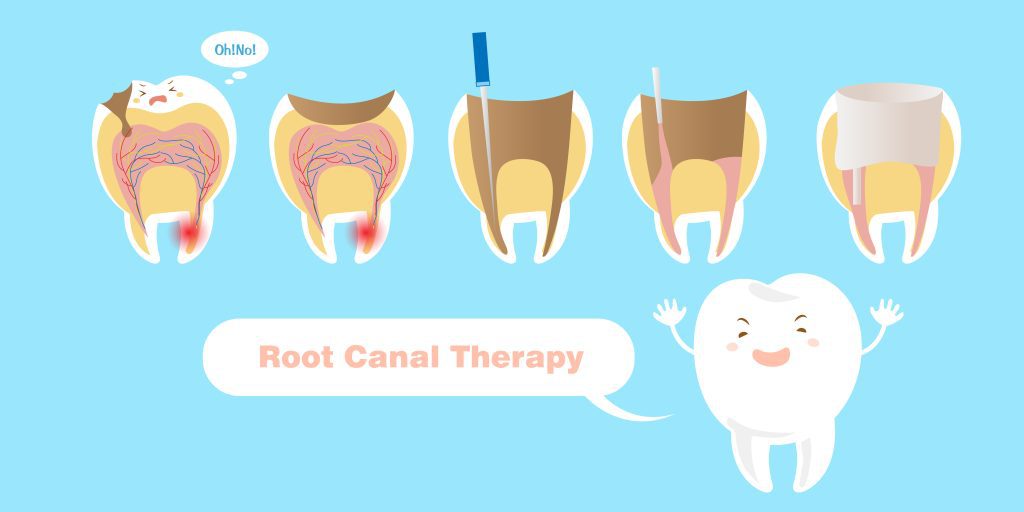
The Benefits of Root Canal Treatment
Nobody likes to experience tooth pain. Whether it’s caused by an injury to a tooth or neglecting good oral hygiene, it can be a challenging experience. Fortunately, root canals provide a simple and effective solution for this type of dental problem.
When it comes to dental procedures, root canal therapy has a reputation for being one of the most dreaded. But did you know that getting a root canal treatment can provide several benefits?
Root Canal Therapy Will Save a Tooth
Root canal therapy has gotten a bad reputation over the years. Still, the truth is that this endodontic treatment is incredibly beneficial for saving a tooth. When the inside of a tooth becomes infected or damaged, a root canal removes the problematic tissue and oral bacteria and replaces the tooth pulp with gutta percha and filling cement. This removes any throbbing pain or discomfort in the affected area and the tooth itself, preserves the tooth structure, fights the potential spread of infection to other teeth, and prevents extraction. In fact, root canal therapy has a success rate of 80-95%, according to the American Dental Association, which means that patients can continue to use their natural teeth for years to come, which can have financial and cosmetic benefits.
Root Canal Therapy Will Ease Pain
Additionally, root canals can relieve severe pain and discomfort associated with the infected material within your tooth. By removing the infected or damaged tissue present inside your tooth, your dentist will help you avoid further tooth pain or damage. Plus, having a root canal can help your dentist identify any existing issues in other teeth. Finally, since the root canal treatment process involves removing and inspecting the inside of your tooth, you may be able to catch any additional dental problems early on that could affect your overall oral health.
Root Canal Therapy Will Prevent the Spread of Infection
Perhaps the most crucial benefit of all, a root canal treatment can prevent the spread of infection from your tooth to other parts of your body. Because this endodontic treatment restores function to injured teeth, it can help to prevent bacteria from entering the bloodstream through the tooth pulp and potentially causing other medical issues.
Root Canal Therapy is Cheaper than Alternative Tooth Treatments
Root canals are also less expensive than dental implants or bridges – which means it’s an ideal solution for those on a budget who still want to maintain their natural tooth structure and smile!
Root Canal Therapy Isn’t a Long Procedure
You may be surprised to learn that root canal therapy is a relatively simple procedure that can be completed in just a few hours within one or two appointments.
So while the idea of a root canal treatment may make you cringe, the benefits are well worth it in the end. Overall, the benefits of a root canal treatment to fix a tooth far outweigh any perceived drawbacks, and it can help you maintain a healthy, natural smile for years to come.

Final Thoughts
Root canals are an important dental procedure for those suffering from severe oral health issues such as trauma, deep cavities, or a diseased tooth. By removing all of the damaged parts of your tooth and replacing them with a special filling material that protects the remaining healthy tissue, endodontic therapy helps prevent any future infection or damage to the tooth while allowing you to keep more of your teeth intact for longer.
Understanding why you might need a root canal and how it differs from a filling is critical to ensuring proper care for any dental issues you encounter! So if you’re ever told you need a root canal for your tooth, don’t be scared – remember that a restored tooth could save your smile in more ways than one!
Root canals may seem intimidating initially, but they actually serve an important purpose—helping preserve and protect your natural teeth! The truth is that modern dentistry has made these tooth-restoring procedures much easier and less uncomfortable than they used to be; plus, if you practice good oral hygiene habits like brushing teeth twice daily and flossing once daily, chances are you won’t ever need one in the first place! If you need a root canal (or want more information about a tooth causing you pain), don’t hesitate to contact us today—we’ll be happy to help!


